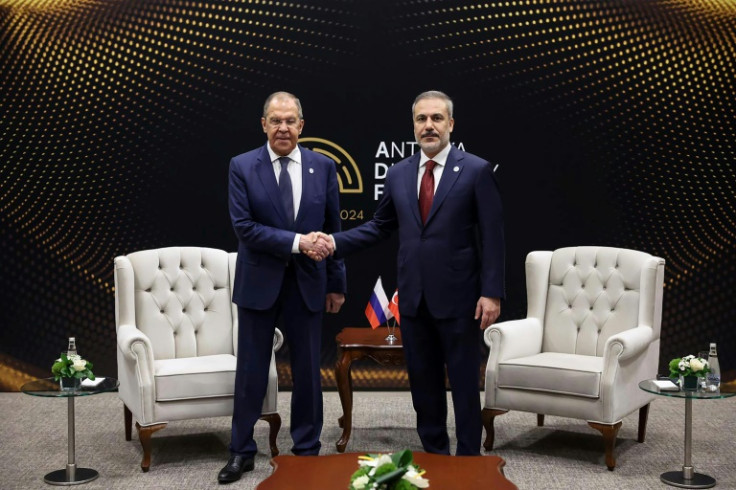Lavrov In Turkey As Erdogan Seeks Ukraine Peace Breakthrough

Russian Foreign Minister Sergei Lavrov on Friday visited Turkey which has sought to revive Russia-Ukraine peace talks and ways to ensure safe navigation in the Black Sea.
Lavrov attended part of the annual diplomatic forum in the Mediterranean resort of Antalya where he met Turkish counterpart Hakan Fidan.
The Russia-Ukraine war was a key talking point at the forum that runs from Friday to Sunday, though Russia's top diplomat is to leave again Saturday.
Since the Russian invasion of Ukraine in February 2022, Ankara has carefully maintained ties with its two Black Sea neighbours.
"Turkey, along with Hungary, remains one of the last countries in the (NATO) Atlantic Alliance to maintain dialogue with Moscow," said Sinan Ulgen, director of the Istanbul-based Edam think tank.
"In a geopolitical context modified by the war, Turkey is careful to keep this role for the future, hoping to capitalise on it during possible peace talks," he added.
Turkey is seeking to revive a 2022 peace effort when top negotiators from the rivals met in Istanbul.
"At the current stage of the war, we need to seriously look for ways to bring the parties together," Fidan said in opening remarks at the Antalya forum.
"We are ready, as yesterday, to make every effort to facilitate peace negotiations," he added.
Fidan told Lavrov during their meeting on the margins of the gathering that Turkey was ready to do its best for the resumption of dialogue between Russia and Ukraine, a Turkish diplomatic source told AFP.
Lavrov acknowledged Ankara's efforts but said the conditions that prompted the war "remained unchanged," the source added.
Turkish President Recep Tayyip Erdogan this week floated the idea of a new secure mechanism for the safe navigation of commercial vessels in the Black Sea.
Turkey, with the United Nations, was heavily involved in the establishment of a secure corridor to ship Ukrainian grain and agricultural products under a 2022 deal. It was abandoned last year after Russia refused to renew it.
The deal, dubbed the Black Sea Grain Initiative, enabled the export of nearly 33 million tonnes of Ukrainian grain, according to UN figures.
Ukraine started using an alternative route for its grain along the coasts of Bulgaria and Romania in August a month after Russia quit the landmark deal.
Turkey, which is highly dependent on Russia for energy supplies, has shied away from joining sanctions against Moscow and is regularly accused by the West of circumventing them.
Sixteen Turkish entities were targeted in the latest round of sanctions unveiled last week by the White House.
Washington accused individuals and companies of helping to supply Russia's industry and furthering Moscow's ability to wage war against Ukraine.
"Given the significant increase in trade between Turkey and Russia... there are in fact investigations into an evasion of Western sanctions imposed on Russia," said Marc Pierini, a senior researcher at the Carnegie Europe think tank.
Pierini also pointed to Russian investment in Turkey's energy sector, including a nuclear power plant, discounts on the price of Russian gas, payments in the ruble currency and the promotion of a gas hub.
Russian nuclear giant Rosatom has also announced a second power plant in Turkey and its interest in a third.
"Turkey is trying to pursue a prudent policy, continuing its commercial relations with Russia while ensuring not to cross a red line which would expose it to retaliation from the West," Ulgen said.
The Antalya forum, Turkey's main annual diplomatic gathering, brings together heads of state and government, ministers, diplomats, businessmen and researchers each year in the resort that is also popular with Russian tourists.
Lavrov went to the forum in 2022, two weeks after the start of his country's invasion. He met Ukrainian Foreign Minister Dmytro Kuleba in the first high-level encounter between the two warring countries.
© Copyright AFP 2024. All rights reserved.




















